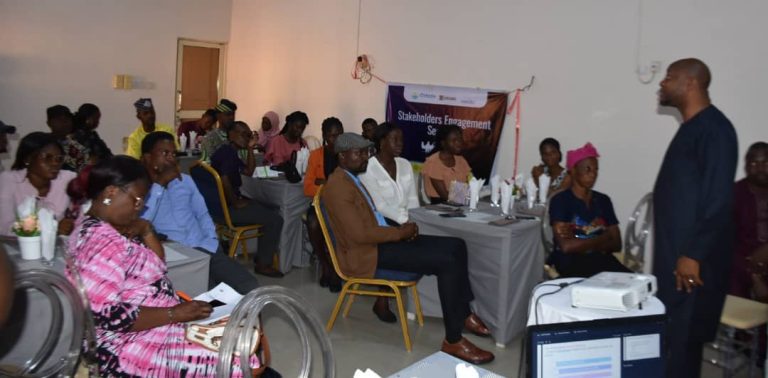Health
Post COVID-19: Experts fear surge in mental health illness

Post COVID-19: Experts fear surge in mental health illness
Experts in mental health have called on stakeholders and governments to put in place measures to forestall the looming mental health problem that might arose after COVID-19 pandemic in Nigeria.
They made the call in Ibadan on Saturday at the Advancing Community Access to Equitable COVID-19 Response programme.
It was organised by Asido Foundation, in partnership with Oxlade Consulting and supported by Open Society of West Africa (OSIWA).
The Founder of Asido Foundation, Dr Jibril Abdulmalik, said at the Stakeholders Engagement Feedback on Community Resilience, that it was very clear to the World Health Organisation (WHO) and the United Nations that beyond COVID-19 as an infection and pandemic, there was a lot of mental health consequences.
Abdulmalik said the consequences were from anxiety to depression, increasing rate of drug use and increasing rate of suicide, among others.
RELATED STORY: French embassy calls for end to discrimination against…
“COVID has caused a lot of mental health problems over time and it continues to cause it.
“So, we need to pay attention to mental health consequences of COVID. We need to prepare.
“COVID-19 has not gone as we are dealing with after shot; people lost their jobs they are not happy.
“They are battling with frustration and economic challenges and many are wallowing of the fringes of suicide thought and hopelessness,” he said.
AbdulMalik, a Consultant Psychiatrist, stressed the need for attention to mental health consequences in the society.
“We need to be aware of it and prepare as well as intervene and encourage people that there is hope; they shouldn’t give up, that there is light at the end of the tunnel.
“Our religious leaders, governments and the media need to keep encouraging people and keep supporting one another until we can finally say we have put this behind us,” he said.
Abdulmalik said that the programme was to identify positive psychosocial community resilience stories from across Nigeria.
“It is to see what are the lessons learnt from how people came together during COVID-19 pandemic to support one another and encourage one another for the future.
“Following the call for stories sent across Nigeria, we had over 100 stories and selected the top three stories from Calabar, Zaria and Ibadan, which was turned into a documentary,” the expert said.
Commenting, the Oyo State Commissioner for Health, Dr Bode Ladipo, admitted that mental health was not given priority during the pandemic, saying that it was one of the lessons learnt going forward.
Ladipo, represented by Dr Femi Akinyode, the State Epidemiologist, said, “The pandemic made us realise that some specialists were in short supply such as social workers and mental health specialists.”
Ladipo stressed the need for emergency funds and improving communication with patients and their families as well as media advocacy during future pandemic.
Also, Dr Muideen Babatunde, the Executive Secretary, Oyo State Primary Health Board, said the state had set up desk for mental health in all the 33 local government areas of the state.
Babatunde, represented by Mrs Funmilayo Abodunrin, a mental health expert, said that the state government would continue to educate people on mental health.
In her remarks, Mrs Ronke Bello, the President, National Association of Nigerian Nurses and Midwives, called for psychosocial support to reduce emotional impact.
On the lessons learnt from pandemic, Dr Ideyonbe Eseile, the President, Association of Resident Doctors, University College Hospital (UCH), Ibadan, said that loss of jobs and inability to get jobs and lack of food for families which still persisted, were indications of a looming mental health problem.
Eseile decried the use of data from developed countries as a model for government intervention and policies which do not reflect the realities in the local context of Nigeria.
In her remarks, Ms Adedayo Ige, a Humanitarian and Programme Manager at Oxlade Consulting, said the programme was targeted at individuals and communities on how they built resilience during COVID-19.
Ige said, “We realised that in Nigeria, we do not have a lot of data, so instead of us relying on developed countries for data, this is one of the ways we can get data and prevent recurrence in the future.”
Post COVID-19: Experts fear surge in mental health illness
Health
“Nigerian Doctors in High Demand as 67% Work in UK – FG”

“Nigerian Doctors in High Demand as 67% Work in UK – FG”
The Federal Government has disclosed that 67 percent of Nigerian doctors currently practice in the United Kingdom. Coordinating Minister of Health and Social Welfare, Muhammad Pate, revealed this during an interview on Tuesday, highlighting the global demand for Nigerian-trained doctors and nurses.
Pate emphasized that the UK’s National Health Service (NHS) would face significant challenges if Nigerian doctors decided to withdraw and return home. This issue is part of the broader concern addressed by the newly approved National Policy on Health Workforce Migration, which aims to curb the mass exodus of health professionals from Nigeria.
Speaking on Channels Television’s *Politics Today* program, Pate noted the critical shortage of healthcare professionals in Nigeria, with only 55,000 licensed doctors serving a population exceeding 200 million. He reported that 16,000 doctors have left the country in the past five years, with about 17,000 being transferred.
Pate proposed that countries benefiting from Nigerian health professionals, like the UK, should invest in expanding training opportunities within Nigeria. “The continuous migration of health workers places a strain on our system. The UK will always need Nigerian doctors. But perhaps they should consider helping us train more, ensuring a sustainable flow of professionals,” he suggested.
Acknowledging the government’s inability to restrict the movement of its citizens, Pate stressed that the focus should be on creating a more favorable environment for health workers to stay and practice in Nigeria. “We cannot stop anyone from leaving, but we are committed to improving conditions to encourage health professionals to remain in the country and to attract those who have left to return,” he added.
Foreign
President Biden Tests Positive for COVID-19, Exhibits Mild Symptoms

President Biden Tests Positive for COVID-19, Exhibits Mild Symptoms
U.S. President Joe Biden has tested positive for COVID-19, the White House announced on Thursday. According to Press Secretary Karine Jean-Pierre., Biden is fully vaccinated and boosted, and is currently experiencing mild symptoms.
The positive test result came after Biden attended an event in Nevada. Following this, he will return to his private residence in Delaware to self-isolate while continuing to perform all his presidential duties remotely.
Biden’s physician reported that the president displayed upper respiratory symptoms, including a runny nose and a cough, in the afternoon. Although the results of a PCR confirmation test are pending, Biden has already received his first dose of the COVID-19 drug Paxlovid.
This marks the second time Biden, 81, has tested positive for COVID-19; he experienced mild symptoms during his previous infection two years ago. Given his age, Biden is at a higher risk for severe illness from the virus.
This latest positive test comes amid increasing scrutiny of Biden’s mental acuity and physical health, raising concerns about his fitness to run for a second term in the upcoming November presidential elections.
President Biden Tests Positive for COVID-19, Exhibits Mild Symptoms
Health
Abuja residents take preventive measures against cholera

Abuja residents take preventive measures against cholera
By Anita Uzoagba/Olamide Kuye
Some residents of Federal Capital Territory (FCT) say they are taking measures to avoid contracting cholera which is spreading in different parts of the country.
The residents, who spoke in separate interviews with newsmen on Saturday, said that proper hygiene was now paramount in their everyday life.
Media reports indicate that deaths from cholera outbreak in Lagos State has risen to 24 with 35 confirmed cases.
There also 417 suspected cases in 20 Local Government Areas of the state.
Mr Kunle Ashimi, the Chairman of the Nigerian Medical Association (NMA) in Ogun State, acknowledged the impact of cholera in 30 states in the country, according to media reports.
The FCT residents told NAN that they were paying extra attention to the sources of food they consume and taking extra measures to keep their environment clean.
Miss Kanayo Gift said she improve on her cleanliness, adding that “I know that cholera is caused by poor sanitation practices, so I ensure that I keep my surroundings clean.
“I dispose my garbage properly, and most importantly, I always make sure I wash my hands regularly.
According to her, she applies hand sanitizer on her hands when she is not at home and unable to wash them.
“I also ensure that my toilet is clean and hygienic”, Gift said.
Mrs Gladys Ohiwere, Assistant Head Mistress, Leadway Schools, said that they had put up safety guidelines for students to protect them from contracting cholera and other communicable diseases.
“We made sure there is tap water flowing around the school environment with soap for washing their hands.
“We also provided sanitizers to use on their hands properly. Whenever a pupil is going to the toilet we ensure a teacher is there to assist them.
“This is to ensure that they use the toilet properly and also make sure that they wash their hands afterwards.
She also told NAN that they strive to ensure that the students did not eat their food with unwashed hands.
Similarly, Mrs Loveth Ezeurike, a teacher at Ariella Ville Academy, said that the school management made sure its environment is clean at all times.
“The classrooms are thoroughly cleaned each day. This includes the student desks and floors. Students are encouraged to always wash their hands after their break time and before entering their respective classrooms.
She added that hand sanitisers have also been provided for every classroom.
“We have also informed parents to ensure their children are in good health before sending them to school” she said.
Malam Bala Musa, a fruit vendor, said usually he washed his fruits once but with the outbreak, he washes them twice with clean water before selling.
“There are some people who are not taking the outbreak of this disease seriously. As for me I will continue to keep my environment clean and maintain hygiene at all times.
I want to keep my customers and myself healthy”, Musa told NAN.
Abuja residents take preventive measures against cholera
-

 Business1 year ago
Business1 year agoNew Rates: ‘I borrowed money to finance this business…’ – Petroleum Marketer cries out over Non-supply of products by the NNPCL
-

 Health5 months ago
Health5 months agoOnly 58,000 doctors renewed licence out of 130,000 registered doctors – MDCN
-

 Entertainment2 months ago
Entertainment2 months agoBBNaija Season 9: TAMI Duo Evicted After Low Vote Count
-

 Defence & Security1 month ago
Defence & Security1 month agoOrganisers Demand IGP’s Dismissal Over Fatal Protest Crackdown
-

 Defence & Security1 month ago
Defence & Security1 month ago“Defence Chief Praises Strong Inter-Service Cooperation for Operational Successes”
-

 Business2 years ago
Business2 years agoNew Naira Notes: We Have No Information On The Supreme Court Ruling – CBN
-

 Weather2 months ago
Weather2 months agoNiMet Forecasts 3 Days Thunderstorms, Rain Nationwide
-

 Opinion2 years ago
Opinion2 years agoAddressing Nigeria’s food security challenge through eco-friendly agriculture


